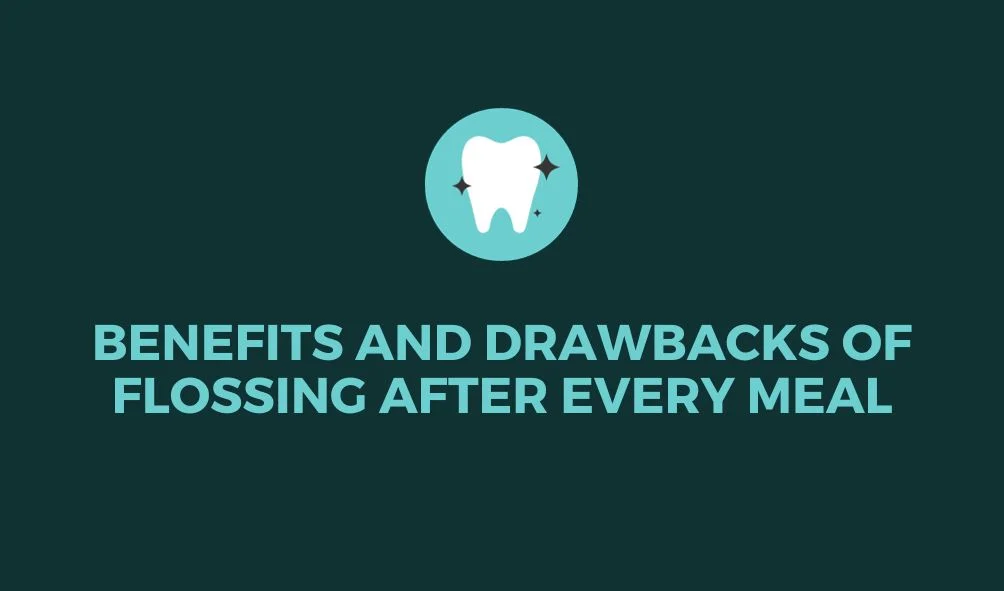Flossing after every meal can help maintain better oral hygiene. But If you choose not to floss after every meal, daily flossing combined with regular brushing and professional dental checkups is sufficient to maintain good oral health.
Daily brushing and flossing and regular dental checkups is adequate for maintaining a healthy and beautiful smile. It’s also important to remember to brush and floss gently to avoid damaging your gums or teeth.
Do i floss after every meal?
Flossing after every meal is not a strict requirement. However, it can be a good practice for some people who are prone to getting food particles stuck between their teeth or have specific dental concerns.
If you have orthodontic appliances like braces that make cleaning difficult, flossing after meals will be helpful. If you have gum disease or are at risk of developing it, your dentist will recommend regular flossing, including after meals, to help manage the condition.
Benefits of flossing after every meal
- Flossing after a meal helps to dislodge and remove food particles, preventing them from turning into plaque and contributing to tooth decay.
- Frequent flossing helps keep plaque levels in check, reducing the risk of cavities and gum disease.
- Flossing after a meal helps eliminate bacteria, contributing to fresher breath.
- Regular flossing, especially after meals, helps maintain healthy gums.
- It can prevent gingivitis (gum inflammation) and the progression to more severe gum diseases like periodontitis.
Should you floss after every meal?
Brushing and flossing after every meal is time-consuming and not always feasible, especially in situations where flosing tools are not readily available. It’s important to strike a balance between maintaining good oral hygiene and practicality in your daily routine.
If you’ve consumed acidic foods or beverages, it’s advisable to wait about 30 minutes to an hour before brushing to avoid potential enamel damage. In the meantime, you can rinse or use gum to freshen your mouth.
Brushing and flossing after every meal
Brushing and flossing after every meal is a proactive approach for maintaining excellent oral hygiene and overall dental health. This practice maintains cleaning your teeth and removing food particles and plaque promptly after eating regularly.
Brushing and flossing after meals remove food particles and plaque effectively, prevents them from turning into harmful bacteria that ultimately leads to tooth decay and gum disease. It can help preserve the appearance of your teeth by preventing staining and discoloration caused by food and beverages.
Common Flossing Mistakes to Avoid After Meals
Flossing too vigorously will damage your gums and even cause bleeding. Use a gentle back-and-forth or up-and-down motion, avoiding excessive force.
Choose dental floss that is appropriate for your teeth and needs. Some people may require thicker or specialized floss. Consult with your dentist for recommendations.
Never reuse floss. Reusing floss can reintroduce bacteria and food particles into your mouth.
After consuming acidic foods or beverages, it’s best to wait about 30 minutes to an hour before flossing. Acid can soften tooth enamel temporarily, and immediate flossing may cause damage.
Wrap up
Brushing and flossing after every meal can be an excellent practice for maintaining good oral health, but it may not be practical in all situations. Even if you brush and floss after every meal, regular dental checkups is essential to monitor your oral health, address any issues, and receive professional cleanings.
If you use floss picks or water flossers, ensure you use them correctly to clean between teeth and along the gumline effectively. After flossing, rinse your mouth with water to remove dislodged food particles and plaque.
FAQ
The American Dental Association (ADA) recommends Waiting for about 60 minutes after eating before you brush your teeth. In This waiting period saliva naturally neutralize acids and remineralize your tooth enamel, which can be softened by the acidic foods and beverages you consume during meals.
Flossing will not whiten your teeth. Rather Flossing maintains the natural whiteness of your teeth by preventing plaque buildup, which can lead to tooth decay, staining, or yellowing over time. To achieve a brighter and whiter smile, teeth whitening products like whitening toothpaste, professional dental treatments, or over-the-counter whitening kits are used.
Flossing after every meal is safe but not necessary. If you feel like there are bits of food stuck between your teeth after a meal, then you could floss. It will prevent the buildup of plaque and reduce the risk of cavities and gum disease.
If you don’t floss, plaque will accumulate between your teeth and along the gumline. Plaque is a sticky film of bacteria that can lead to cavities and gum disease. Neglecting floss will contribute to bad breath (halitosis) since food particles and bacteria trapped between teeth emit foul odors.
It is not absolutely necessary to floss after every meal. Flossing after every meal can be a proactive approach to maintaining oral health, but it’s not a strict requirement for everyone. The key is to establish a consistent oral hygiene routine and to do so effectively and gently.

